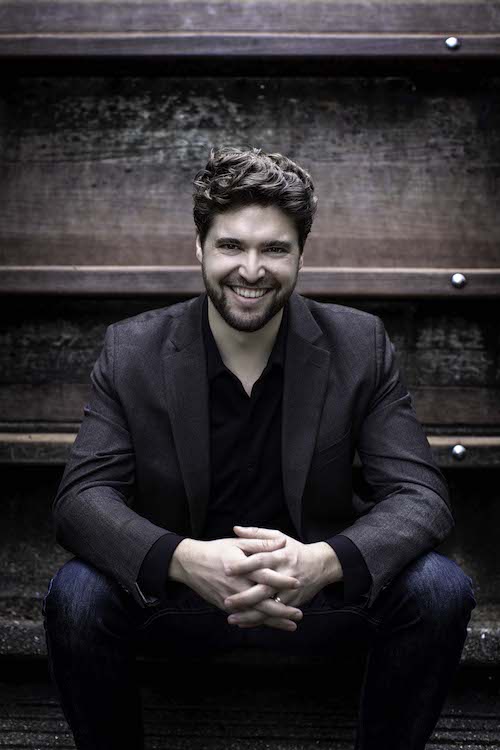Washington Classical Review » Blog Archive » Christian Reif Brings Excitement and Eagerness to Baltimore Symphony Orchestra Program
Christian Reif conducted the Baltimore Symphony Orchestra Thursday night at the Music Center in Strathmore. Photo: David Kim
The Baltimore Symphony Orchestra is looking for a new music director to replace Marin Alsop, who resigned last September. Each guest conductor who steps onto the podium with the ensemble could become a candidate for the position, although the orchestra management has not yet given any indications. The latest young face to take the helm was German-born bandleader Christian Reif, with a varied program on Thursday night at the Music Center in Strathmore.
Reif is at the start of his career, following studies and residencies at Juilliard, New World Symphony, San Francisco Symphony and Tanglewood. This season, he’s taking a number of guest tours at various locations. He is currently Music Director of the Lakes Area Music Festival in Minnesota. He may be familiar to those who have spent the pandemic lockdowns watching live concerts, from a video concert he made for NPR with his wife, soprano Julia Bullock.
As in this online performance, Reif’s main asset turned out to be his musicality and sensitivity as an accompanist. It opened with “Mänadentanz”, an orchestral arrangement of a lively scene from Hans Werner Henze’s opera The Bassarids. Last heard by the NSO in 2013 under Christoph von Dohnányi, it depicts the abrupt end of the ruler of Thebes, Pentheus. Tricked by Dionysus into participating in the god’s frenzied celebrations, Pentheus disguises himself as a woman. Discovered, he is torn apart by the Maenads, among them his own mother and sister.
Reif directed the work with admirable gestural precision, signaling the stacking of entries with crisp efficiency. Giving the opulent array of percussion instruments an almost limitless range, this rendition brought out the Bernstein-like revelry of the bacchanalia. At the climax, beautiful solos from horn and principal cellist Dariusz Skoraczewski, giving voice to the dying Pentheus, had room to sing along. A fury of clashes in the orchestra swelled to a discordant climax.
Reif’s best work came in a deftly etched rendition of Mozart’s Symphony No. 39, the least beloved of the composer’s last three symphonies, composed as a set in the summer of 1788. Particular attention to differences in articulation helped sculpt the slow introduction to the first movement, but a rushing tempo in the Allegro section gave more than a wild rush. The emphasis in fast movements was too much on impetuous speed.
Too bad, because the delicate second movement has established itself as an utterly charming Mozart. The beat had forward movement but allowed every detail to be smoothly put together, with seamless balances throughout. The Menuetto seemed too brisk for an Allegretto, a haste that stood out even more in the charming Trio, where the clarinetist and flautist added dizzying ornaments over the two repetitions. With a little more space, it could have equaled the slow movement of charm.
The BSO musicians could certainly play the finale as fast as Reif pushed them, but the results were harassed. In the third and fourth movements, Reif lost control of the whole thing a bit, as sections occasionally rushed past the already brisk pace. His dance moves and showboating hand gestures also distracted from the music. A more minimal ride might have kept things together more effectively.

Awadagin Pratt. Photo: Rob Davidson
The BSO has co-commissioned the new piano concerto Sleeves by composer Jessie Montgomery, who opened the second half. Created in March by the Hilton Head Symphony Orchestra, it’s a brilliant piece, given a relaxed atmosphere by its soloist, pianist Awadagin Pratt, and the strings of the BSO. Pratt rolled easily through the initial running figures on the keyboard, with a descending melody marked by the motifs, somewhat reminiscent of Ravel’s style.
Montgomery’s harmonic palette in the piece is pleasingly varied, as the second section featured a more active theme in bitonal chords, echoes of Stravinsky Petrushka. In his program note, Montgomery compared these musical ideas to birds flying in circles and endless patterns of fractals. These ideas returned in a rondo form throughout the piece, alternating with slow interludes, the shimmering meditation of the piano backed by unison melodies and roaring patterns in the strings.
A long cadence marked the approach of the final statement of the main theme. This solo passage was partly left to Pratt to improvise, and it meandered loosely through a number of ideas. The hammered octaves led to a moment of surprise, with some notes struck directly on the strings directly under the piano lid.
This new concerto, also inspired by the dance theme that was at the heart of this program, diverted the ear and the mind, without making much noise with a virtuoso firework display for soloist or ensemble.
Where the orchestra needed a more seasoned hand the most was in Strauss’ Suite conclusive The Rider of the Rose. With large orchestral forces, as in the “Mänadentanz,” Reif tried to micromanage the vast panoply of detail, but the added fuss obscured more than clarified. The individual musical contributions were solid, including the horn solos in the overly rambunctious opening and the soft sigh of the oboe, accompanied by the shimmering chords of the Silver Rose music.
Reif made the best effect in the mid-section waltzes, full of Viennese rhythmic hesitations and sentimentality of the heart on the fretboard. Concertmaster Jonathon Carney sweetened the pot with nostalgic violin solos, but the Trio and Duo sections based on the opera’s poignant final scene felt rushed. The breathless return of the Silver Rose chords, embellishing the end of the Octavian-Sophie duet, underlined the excessively fast tempo. The chaos of the conclusion, the cacophonous music surrounding Ochs’ exit earlier in the third act, was maximum.
The program will be repeated at 8 p.m. Friday and Saturday and 3 p.m. Sunday at Meyerhoff Symphony Hall. bsomusic.org


Comments are closed.